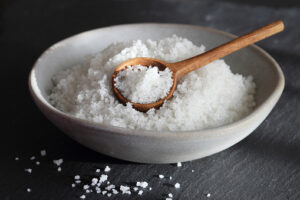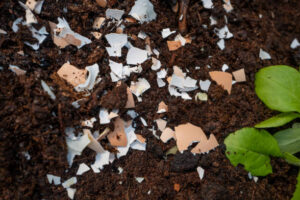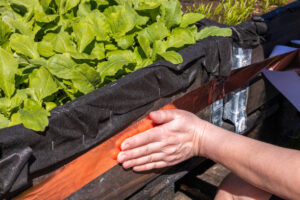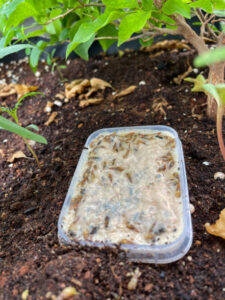Homemade slug repellent is a great way to keep slugs and other pests where they belong outside. There are some homemade products in your home and on the market that you can use to repel these pests from your garden area.
You’ve invested in your garden, and slugs are your nemesis at this point. We’re talking about the slimy little pests that cause damage to our vegetables and flowers. They eat your plants, destroy your landscape, and otherwise make things messy. What can we do to make them go away?
Homemade slug repellents are a great way to keep these pesky unwanted pests at bay. Not only will some of these methods protect plants from slugs and snails but also from aphids, mealybugs, and other insects. All you need are some ingredients you can easily find in your kitchen or garden store.
It’s easy to make one of your homemade slug-repellent formulas to keep these pests out of your garden. This article will cover how to make homemade slug repellent, why it works, and what ingredients you will need to mix your concoction.
What attracts slugs to your garden
Slugs are one of the most common pests in gardens. They can be found in vegetable, fruit, and ornamentals gardens. They’re attracted by the fact that the soil around them is warm, moist, and rich in nutrients.
These pests feed on your plants and leave behind a trail of slime when they move. Slugs are mainly found in moist, dark, and damp areas such as compost heaps, stables, and manure stores.
They prefer moist places with high humidity, such as compost heaps, stables, or manure stores, where they can find shelter from predators such as birds or mice, which normally eat them.
They will seek out new food and water sources as they grow in numbers, so it’s important to keep an eye out for this. Slugs also like to burrow into the ground and suck up water.
In summary, Here are some of the most common things that slugs find appealing:
- A moist substrate
- A lack of predators
- A lack of acidic soil
- A source of water
Knowing what attracts slugs to your garden will make it easy to control and eliminate them. However, it is almost impossible to make your garden less moist or lack fresh and nutritious leaves that would attract these pesky pests. Below, you will find the various ways to deter, kill and repel slugs and snails from your garden.
DIY Homemade Natural Slug and Snail repellent
DIY slug repellent is a great and economical way to keep slugs away from your plants. Slugs can be a real pain, especially if they’re eating your plants’ leaves, causing stunt growth and killing them.
You can make various slug repellents to keep them away, but you’ll need to ensure that the repellent doesn’t kill your plants. This way, you are not putting the whole garden in danger.
There are several different kinds of repellents out there: some are toxic, some are sweet-smelling, and some just taste bad. Some work better than others, So how do you know which one is right for your garden? We have experimented with different types of homemade slug repellent safe for dogs and other pests.
Coffee grounds
Coffee grounds are one of the best natural ways to repel slugs and snails, and they’re also a favorite of gardeners everywhere.
It is made of ground-up beans that have been roasted and then ground. They are rich in caffeine, making them an effective pest repellent, and they can also be used to nourish the soil.
The caffeine in coffee grounds is absorbed by slugs and snails through their skin, causing them to leave your garden or lawn in search of a less caffeinated environment. Coffee grounds can be applied directly on top of plants or used as fertilizer around plants.

How to use
- You can mix equal parts coffee grounds powder with water in a spray bottle and shake it until thoroughly mixed. Then spray it around your garden to keep slugs away.
- You can also sprinkle these grounds in powder form around your plants to repel slugs.
- It can also be mixed with the soil to nourish and repel slugs from eating your plants.
Are there any side effects?
- Too much caffeine can cause stunt growth in roots, fruit, and flowers.
Diatomaceous earth
Diatomaceous earth is a natural slug repellent and pesticide. It’s a soft, silky substance from the fossilized remains of microscopic organisms called diatoms. The dust is harmless to humans and animals, but it’s extremely effective at killing slugs and other pests.
When applied to the ground or garden, this substance can be used as an organic pest control product for indoor and outdoor gardens and yards. It works by creating an abrasive surface that kills these unwanted pests by cutting their exoskeletons.
These tiny particles cause them to dehydrate and die when they try to crawl over or through them. It’s also non-toxic to humans and pets if ingested in small amounts (which shouldn’t happen anyway).
How to use
- Spray DE around your plants to kill and repel slugs and snails.
- Make a DE Spray by mixing one part diatomaceous earth with four parts water in a spray bottle. Spray the mixture around where you want to plant your garden. It should be applied up to three times per week, depending on the severity of the problem.
Sprinkle Salt around plants
Salt is a great way to repel slugs. It’s cheap, easy to find, and can be used in various ways. The salt draws moisture from the slug, which makes it dehydrate and die. This works best if you get a small bowl of salt and scatter it around your yard.
You can sprinkle salt onto the area you want to protect from slugs (like along the edges of your garden). You can use various salts; however, ensure not to use too much salt around your plants.

How to use
- Sprinkle salt around the base of your plants. If you need help sprinkling salt around, you can use a rake, trowel, or hands to sprinkle this salt around your yard.
- Make a salt spray; Mix five gallons of water with two to three tablespoons of salt. Add two tablespoons of vegetable oil or apple cider vinegar (optional) if you want a little extra help keeping the slugs away. Mix well and spray around your garden to keep slugs away. You can also mix some into the soil around the base of your plants if you want them even more protected from those nasty little buggers.
Side effects
If you use too much salt, though, it can kill your plants. It’s important to test how much is needed for your situation before adding more than 1 tablespoon per square foot area.
Cinnamon
Did you know that cinnamon can be used to make homemade slug repellent? It’s not just for Christmas anymore.
Cinnamon is a popular repellent for slugs because it contains cinnamaldehyde, a natural antifungal agent. It can be applied to plants or soil, and the scent will repel slugs while feeding on the plant.
Cinnamon is a natural insecticide that kills slugs (and any other pests) on contact. So you have to sprinkle some cinnamon on your plants and then forget about it until the next season. It can be used in various ways, including spraying or sprinkling on the ground.
First, you’ll need to find some cinnamon sticks. You can get them at most grocery stores; remember to buy the sticks about three inches long.
The best part is that cinnamon is cheap and easy to find at any grocery store; it does not harm plants or pets, making it safe for home use.
How to use
- To use cinnamon as a spray, mix some cinnamon with water and pour it into a spray bottle. This will work best if you let it sit for a few days before using it.
- You can also sprinkle some cinnamon around your house or garden. Make sure you don’t put too much; you don’t want to kill any beneficial insects living there.
Use Ammonia
Ammonia is an effective solution to killing slugs and other garden pests. It’s easy to make, safe, and inexpensive. It works on all slug species but is particularly effective against the common American slug.
You can make your homemade slug killer using household ammonia and a spray bottle. All you need is ammonia, water, and a spray bottle.
For this recipe, you’ll need the following:
- 1/2 cup of ammonia (if you’re using liquid ammonia, use 1/4 cup)
- 3 cups of water
- Small spray bottle
Mix the ammonia and water in a bowl. Next, add the mixture to your spray bottle and shake well to combine the ingredients. Then, use this homemade deterrent wherever you find slugs, in your garden, the woods, or anywhere else. It should be put out at dusk when slugs are most active.
Rosemary Oil Spray
Rosemary oil is a natural insect repellant that can keep slugs, snails, and other pests away from your home. It’s also great for keeping mosquitoes and other insects at bay. It’s a cheap, effective solution used in your garden and patio.
To make your rosemary oil spray:
- Combine 1 cup of distilled water with 1 tablespoon of rosemary oil in a small spray bottle.
- Shake well before each use.
- Spray the mixture on all exterior surfaces of your garden as often as needed to keep pests away.
Garlic Spray
Garlic is another effective homemade, and inexpensive way to repel slugs. The smell of garlic is repugnant to slugs, and the compounds in garlic are toxic to them. A strong bulb of fresh garlic will keep snails and slugs at bay for up to a month.
You can also make your garlic spray using sliced cloves of garlic and water, but it’s probably best to buy the pre-made version for this purpose. Garlic spray around your plants is safe for your plants, pests, and kids, so there is nothing to worry about.
How to use
- All you need is two tablespoons of minced garlic, a four-ounce bottle of water, and one teaspoon of dish soap or salt. Pour the mixture into the bottle, shake it well, and spray.
- Another option is to place a strip of fresh garlic around your garden plot every few weeks during the growing season, preventing slugs from establishing themselves in your garden.
Use Epsom Salt
If you want to keep the slugs from returning, you’ll want to ensure your garden is free of them. You don’t need to go out and buy a slug repellent or even know how to make one. You can make your own at home with just a few simple ingredients, and it won’t cost you anything!
You’ll need Epsom salt, which is a type of magnesium sulfate. Other types of salt (such as table salt) will work, but this one is special because it’s been used for centuries in bathhouses to promote relaxation and good health.
Epsom salt works because it has a high concentration of magnesium ions. These ions work together with certain bacteria living on slugs and snails to form an antifungal soap naturally drawn toward the surface of the slug or snail and prevent them from sticking around long enough to cause harm.
How to use
- You can use Epsom salt as a homemade slug repellent by sprinkling it on the soil around your plants. This will prevent slugs from getting into your garden and eating up all your plants.
- It’s also a great way to fertilize. Epsom salt contains magnesium and potassium, both essential nutrients for plant growth. So if you’re worried about not having enough nutrients in your soil, using Epsom salt around your plants can help fill those gaps.
Use Eggshells
Create a homemade slug repellent by sprinkling eggshells around the perimeter of your garden. They will keep slugs and snails away. They’re cheap and easy to get, and they work great. You can even buy them in bulk if you want.

This method is effective because slugs don’t like the texture of eggs on their slimy texture and will avoid them. There are different ways of using eggshells to repel slugs in your garden. You can scatter the shells around the garden or yard, and they’ll keep slugs away for good.
You can also sprinkle it inside pots or at the base to keep slugs and snails away from your plants.
Using Petroleum Jelly to Repel Slugs
Petroleum jelly is a great way to keep your garden free from annoying slugs because it’s an effective barrier against moisture and a strong odorant. They’re easy to use around the yard where you want to keep these pests away.
However, the process of applying can be stressful, making it ideal to use for potted plants. Apply a thin layer of petroleum jelly to the base of your plants and mulch; no matter how hungry slugs are, they’ll steer clear.
Use Ducks to Repel Slugs
Ducks are natural predators and will eat slugs on sight. The best thing about ducks is that they don’t just eat slugs—they help keep harmful bacteria and fungi at bay. Ducks are very smart creatures and know exactly what they need to do to survive. Allowing ducks to roam around your garden will eat any slug they come across, keeping the numbers of these pests down over time.
Use Seaweed
When it comes to DIY homemade slug repellent, there are tons of options. You can try using seaweed, one of the most popular DIY options.
Seaweeds are living organisms that grow in the ocean and have a negative effect on slugs and snails. They protect from predators and parasites, so they’re a great choice for slug control.
The seaweed will absorb the moisture from the slug and make them unable to survive. You can also use this treatment in your garden to keep slugs away. It can be planted in your garden or in pots on your patio or deck. You can even make your seaweed tea (spray).
How to use
If you want to use seaweed as an instant slug repellent, pick up some seaweed at the store and dunk it in water until it’s moist enough to drink with no visible bits. Then take some of this liquid into your garden or patio area where you want to protect against slugs.
It’s important that you don’t add too much seaweed because it will negatively affect other plants that may be growing in the area. You also don’t want to use too much because the taste will probably be unpleasant!
Copper Tape
Copper tape comes in handy in a slug war. This tape is a great way to repel slugs and snails. It’s inexpensive, easy to find, and reusable.
The copper ions in the tape will cause them to be repelled by the metal so that you can lay it down around your garden, and they will stay away from the plants and soil.
Copper tape does not contain harmful chemicals, so you can use it on any plant or garden area. It’s also an environmentally friendly alternative to other slug/snail repellents that contain pesticides or dangerous chemicals.

How to use
Place strips of copper tape on the plants in your yard—the slugs and snails won’t be able to get through it.
The copper tape is usually applied to the base of plants, around the edges of planters and terraces, or in other areas where pests tend to congregate. The tape will act as an invisible barrier against slugs and snails, which are attracted to the metal but cannot penetrate it.
Mulch to keep slugs away
Mulch is a great way to reduce the amount of moisture available for slugs, making your garden less appealing.
Mulching is the process of covering your garden with a layer of organic matter, such as grass clippings or straw, to keep slugs away. It helps keep weeds from growing and protects the roots of plants from damage. It creates a barrier between the soil and pests like slugs.
This can be done in the fall or spring before you plant, and it helps keep the garden healthy and pest-free until spring. You can mulch over your vegetables and flowers, but avoid covering them up completely; you want to leave enough soil for them to grow through.
Slug-repellent mulch can be made from any material, from crushed eggshells to grass clippings and coffee grounds. The most effective mulch to use is those with sharp edges that will prevent slugs from crawling around your garden. Some popular options include wood chips, bark mulches, shredded paper, and sawdust mulches.
Use Plants they hate
Companion plant is a great way to keep slugs from eating your plants, and the best part is you don’t have to spray yourself with anything dangerous. You can do this by planting various plants these pests hate and other vegetables and herbs. Here are some plants that will repel slugs:
- Basil (Laurus nobilis) – Basil repels slugs by making them feel ill. They’ll avoid it as well!
- Chives (Allium schoenoprasum) – Chives also make slugs feel sick. They’re not too fond of chives, either.
- Dill (Anethum graveolens) – Slugs hate dill, which can be used in recipes like pesto and dill pickles. It’s also a great addition to salads and soups!
- Oregano (Origanum vulgare) – Oregano has similar properties as basil and chives, but it also contains thymol, an antiseptic that helps prevent infections caused by slugs. If you have any containers for your herbs or vegetables, try planting oregano around your plants so they can enjoy protection from the little buggers.
Other plants Include
- Lantana
- Horsetail
- Weeping Fig
- White Oak Tree
- Eucalyptus
- Mint
- Rosemary
- Thyme (Check them out)
Beer Trap
Beer traps are great for trapping slugs and killing them in your garden. The beer attracts slugs to the trap, where they get drowned. You can buy beer traps for slugs online or make one yourself.
There are many different ways to make a beer trap, some include a large plastic jug of water with holes poked in it, but the one we’re going to show you here is simple and effective:

Here’s how it works:
Pour beer into a small container with holes in it. Dig and place it where you find slugs in your garden and make it level with the floor. The slugs will try to get into the container but won’t be able to get out through the hole.
The beer will kill off slugs that try to get into your can by drowning them in alcohol, and it’s not toxic to humans or pets.
Aluminum foil
This is one of our favorite homemade slug-repellent tricks because it’s easy and inexpensive. You can buy it in any grocery store or hardware store.
Aluminum foil is a good way to keep slugs away from your plants. Just cut a piece of aluminum foil into strips, and then wrap the strips around the base of your plants. This will prevent slugs from crawling up onto the ground and eating your plants.
Try Baking Soda
Baking soda is one of the most versatile ingredients in your DIY projects. It can be used to make a natural slug repellent and is easy to find in most grocery stores. It will also kill them if they do come by.
If you sprinkle a little baking soda around your garden, you’ll see that it absorbs moisture and slows slug growth. You can also use this method to kill other pests like fleas, ants, and flies. This is great for pets too.
Alternatively, you can make a spray with baking soda to keep these pests away for long. To make a natural slug repellent, combine 1 cup baking soda and 1/2 cup white vinegar in a bowl. Stir well until the baking soda and vinegar have combined. This mixture will be used as a base for your homemade slug-repellent spray, so ensure it is thoroughly mixed before applying it to any plants you want to protect from slugs and snails.
Spray your plants with the homemade slug repellent every few days when you see signs of slug attacks happening. This method should be able to keep them away for several weeks at a time, depending on how often you spray your plants with this homemade repellent spray recipe.
Use Bran to Repel Slugs
You’ve heard of apple cider vinegar, but have you heard of bran? It’s a natural substance that can help repel slugs.
Bran is made up of the outer husks of grains. It is high in fiber and vitamins and has been used since ancient times to treat everything from indigestion to heartburn. But one of its most interesting properties is that it attracts slugs.
Bran is a great ingredient for adding texture to your garden and compost pile, but it’s also great at repelling slugs.
You can buy bran at most health food stores or online. Add a tablespoon to your garden every week or so, and watch as the slugs leave—or don’t come back.
Best Natural slug repellent spray
If you can’t go through the stress of mixing these materials, opting for commercial natural slug killers is better. These pesticides are made of organic products that do not affect your plants and are safe around kids and pests. There are lots of them, but then you can use include.
Exterminators Choice Slug and Snail Spray
Exterminators Choice Slug and Snail Spray is a powerful all-natural, easy-to-apply, long-lasting solution that kills slugs and snails on contact. It works by dehydrating the slug and snail’s body, but not their digestive tract.
The diminishing “attraction” of a dying or dead slug or snail to its food source prevents them from breeding. The product is a safe, natural way to help alleviate the heavy infestation of slugs and snails without using chemicals.
Garden Safe Slug & Snail Bait
Garden Safe Slug & Snail Bait is a chemical-free formula that can be used for controlling slugs and snails. This formulation is mild on the palates of pets and creates no foul odors.
Made with a slow-acting poison to help control slugs, snails, and other garden pests for months at a time, Garden Safe Slug & Snail Bait will not be eaten by pets or fish.
Slug baits help prevent damage to your plants and soil, which saves you time, money, and aggravation.
Monterey Sluggo Plus Wildlife and Pet Safe Slug Killer
Monterey Sluggo Plus Wildlife and Pet Safe Slug Killer is a proven effective pesticide that can kill slugs, snails, millipedes, and other pests in your garden. It is non-toxic and safe to use around pets, children, and animals.
This environmentally friendly product reduces damage to gardens with more than 40% more control of pests than traditional chemical pesticides. Its easy application means that you’ll be able to tackle your slug problem quickly and effectively.



